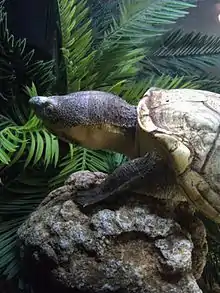| Rough-footed mud turtle | |
|---|---|
 | |
| Scientific classification | |
| Domain: | Eukaryota |
| Kingdom: | Animalia |
| Phylum: | Chordata |
| Class: | Reptilia |
| Order: | Testudines |
| Suborder: | Cryptodira |
| Family: | Kinosternidae |
| Genus: | Kinosternon |
| Species: | K. hirtipes |
| Binomial name | |
| Kinosternon hirtipes (Wagler, 1830) | |
| Synonyms[2] | |
| |
The rough-footed mud turtle (Kinosternon hirtipes) [1] is a species of mud turtle in the family Kinosternidae. The species is endemic to the southwestern United States and northern Mexico.
Geographic range
K. hirtipes is found in the United States in Texas, and it is also found in Mexico in the Mexican states: Aguascalientes, Chihuahua, Coahuila, Mexico DF, Durango, Guanajuato, Jalisco, Mexico State, Michoacán, Morelos, and Zacatecas.
Diet
As omnivores, the diet of K. hirtipes primarily consists of vegetation and insects including filamentous algae, seeds and fruits, aquatic, terrestrial, flying arthropods, as well as aquatic gastropods. K. hirtipes undergoes a dietary shift from insects to vegetation as body size increases which facilitates rapid growth. Although male K. hirtipes are larger in size than females, both sexes share a dietary overlap consuming similar foods. [3]
Predation
Based on tracks around kill sites, bite marks and shell damage it has been determined that the main predators of the K. hirtipes are racoons and feral pigs. Not surprisingly, both racoons and pigs are known to hunt several other species of turtle. These turtles seem to be relatively "immune" to predation but are at the highest risk when coming out of the water to nest.[4]
Subspecies
Five subspecies of Kinosternon hirtipes are recognized as being valid, including the nominotypical subspecies.[5]
- Valley of Mexico mud turtle – Kinosternon hirtipes hirtipes (Wagler, 1830)
- Lake Chapala mud turtle – Kinosternon hirtipes chapalaense Iverson, 1981
- San Juanico mud turtle – Kinosternon hirtipes magdalense Iverson, 1981
- Viesca mud turtle – Kinosternon hirtipes megacephalum Iverson, 1981 (Extinct)
- Mexican Plateau mud turtle – Kinosternon hirtipes murrayi Glass & Hartweg, 1951
- Patzcuarco mud turtle – Kinosternon hirtipes tarascense Iverson, 1981
Etymology
The subspecific name, murrayi, is in honor of American zoologist Leo Tildon Murray (1902–1958).[6]
References
- 1 2 van Dijk PP, Hammerson G, Vazquez Diaz J, Quintero Diaz GE, Santos G, Flores-Villela O (2007). "Kinosternon hirtipes (errata version published in 2016)". The IUCN Red List of Threatened Species 2007. http://oldredlist.iucnredlist.org/details/63670/0
- ↑ Fritz, Uwe; Havaš, Peter (2007). "Checklist of Chelonians of the World". Vertebrate Zoology. 57 (2): 252–254. doi:10.3897/vz.57.e30895. ISSN 1864-5755. S2CID 87809001.
- ↑ Platt, Steven (Apr 2016). "A Dietary Study of the Rough Footed mud turtle (Kinosternon Hirtipes) in Texas, USA". Herpetological Conservation and Biology. 11: 142.
- ↑ Platt, Steven (March 2019). "Notes on the predation of rough-footed mud turtles (Kinosternon hirtipes) in west Texas, USA". Western North American Naturalist. 79 (1): 130–134. doi:10.3398/064.079.0113. S2CID 196650465.
- ↑ Species Kinosternon hirtipes at The Reptile Database
- ↑ Beolens, Bo; Watkins, Michael; Grayson, Michael (2011). The Eponym Dictionary of Reptiles. Baltimore: Johns Hopkins University Press. xiii + 296 pp. ISBN 978-1-4214-0135-5. (Kinosternon hirtipes murrayi, p. 185).
External links
- Wagler J (1830). Natürliches System der Amphibien, mit vorangehender Classification der Säugthiere und Vögel. Ein Beitrag zur vergleichenden Zoologie. Munich: J.G. Cotta. vi + 354 pp. (Cinosternon [sic] hirtipes, new species, p. 137). (in German and Latin). .
